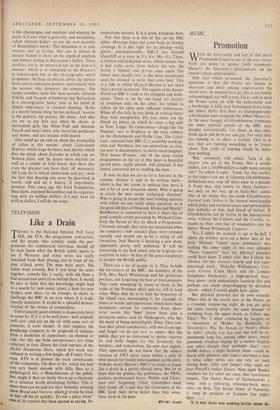TELEVISION
Like a Drain
THANKS to the National Opinion Poll, Lord Hill, the ITA, •the programme contractors, and the people who actually make the pro- grammes for commercial television, should all by now know what the British public wants to see if Westerns and crime series are really banished from their placing just in front of the nine o'clock news. The men want sport. The ladies want comedy. But if you lump the sexes together, comedy has it easily, with old films a bad second and sport close behind them. It would be nice to think that this knowledge might lead to a search for new comic talent, a hunt for new writers, new ideas—to an attempt, in short, to challenge the BBC in an area where it is tradi- tionally dominant. It would be a splendid demon- stration of the virtues of competition.
Unfortunately good comedy is desperately hard to come by. If it is to be well done—well scripted, Well cast—and put on the air with some sort of panache, it costs money. It also require k the producing company to be prepared to contem- plate a modicum of experiment, an element of risk; but this the bold entrepreneurs are often reluctant to face. Hence the tired routines of the Dickie Henderson Show, which last week was reduced to scoring a few laughs off Freddy True- man. ATV is at present the most adventurous of the companies. The Best of Six, which has had one very funny episode with Alfie Bass as a Pathological liar, a Munchhausen of the public bar, might if they are lucky throw up a character or a situation worth developing further. This is more than can be said for their Saturday evening Show Broad and Narrow, which jt would be kind to take off the air quickly. 'It's not a jokey show,' One of its creators has been quoted as saying. He
understates matters. It is a great, pompous bore.
Not that there is a riot of fun on the BBC either. Marriage Lines has come back on Sunday evenings. It is just right for its placing—mild, gentle, unexceptionable. BBC-2 has Donald Churchill as a zany in It's Not Me—It's Them, a verbose old-fashioned series, which sounds like a bad radio series from before the war. He writes it himself and proves once again that funny men should only in the most exceptional cases. be allowed to write their own lines. This is a role to which Michael Bentine is not more than a partial exception The repeats of his Square World on BBC-1 confirm his strengths and weak- nesses. There is, on the one hand, his fertility of invention and, on the other, his refusal to follow up his ideas with •sufficient ruthlessness. When all else fails he can think ot nothing better than mild xenophobia. His best items are the filmed set pieces, in which he owes a big debt to Tony Leggo, his cameraman—things like the Nannies' race to Brighton or the train robbery on the Dymchurch and Hythe Line. The Likely Lads, repeated from BBC-2, is modishly working- class and Northern, but too naturalistic in style, too near to documentary, to excite much laughter. That leaves Wooster, one of the most stylish programmes on the air at this time—a beautiful period piece. nicely played. well directed. It has almost converted me to reading the man.
It may be that we are in for a fun-fest in the autumn. Steptoe is said to be coming back— which is fine but seems to indicate that there is not a lot of new invention about. Who is going to create the next comic archetypal situation? Who is going to invent the next howling neurosis with which we can really enjoy ourselves as in the good old days of Hancock. Drake and Worth? Rediffusion is rumoured to have a short run of good comedy scripts presented by Michael Craw- ford, the Byron of Not So Much a Programme. Curiously enough, they were not mentioned when the company's new season's plans were revealed recently and turned out to be a string of old favourites. Ned Sherrin is hatching a new show, apparently pretty well unbowed. It will be interesting to see how much rein he is given—or contrives to take—in face of the great conspiracy to protect the British public.
There are a lot of people in it. They include the Governors of the BBC, the members of the ITA, Mrs. Mary Whitehouse and her grass-root puritans, not forgetting the host of bien-pensants. They came whooping in, many of them, in the wake of the Profumo affair and are still in loud voice. What they do is to feed the hypocrisy of the island race, encouraging it, for example, to wince at words and expressions which have been harmlessly current for centuries. Even three- letter words like 'bum' throw them into a' paroxysm unless used by Shakespeare, who has the merit of being unintelligibly filthy. They con- fuse their jolted complacency with moral outrage, and forget—or do not care to admit—that the public they are so concerned to shelter reserves its real belly laughs for the lavatorial, for knickers, and transvestism, the new vice anglais. They apparently do not know that the wildest excesses of TW3 never came within a mile of what passes for family entertainment on the piers. Nobody wants Sherrin's BBC-3 to make us laugh like a drain in a purely cloacal sense. But let us hope that the prudes, the politicians, the PROs, prelates, professional Scots-, Welsh- and Ulster- men—not forgetting Chief Constables—keep their hands off it and that the Governors of the BBC keep their nerve better than they some- times have in the past.
STUART HOOD


































 Previous page
Previous page